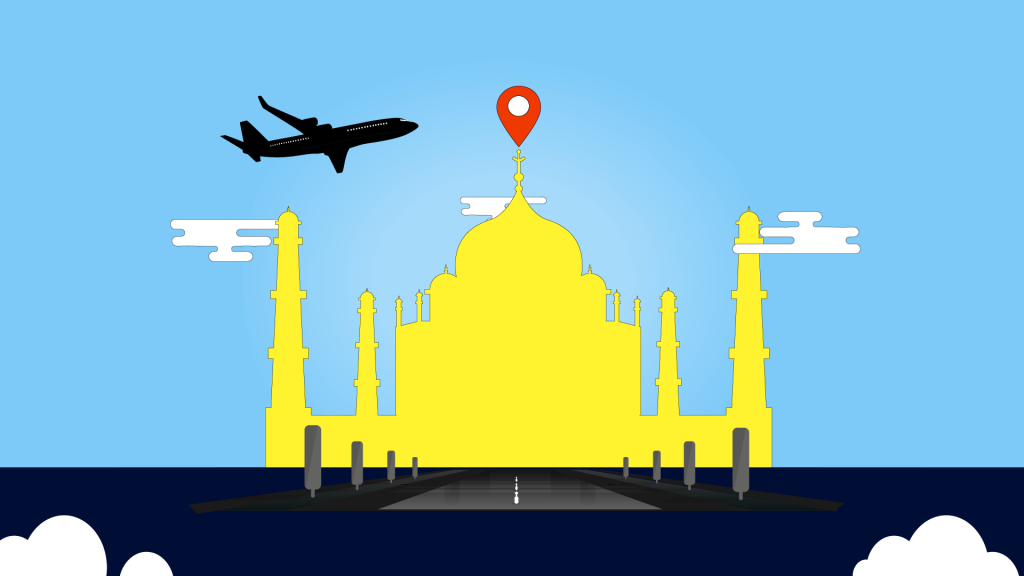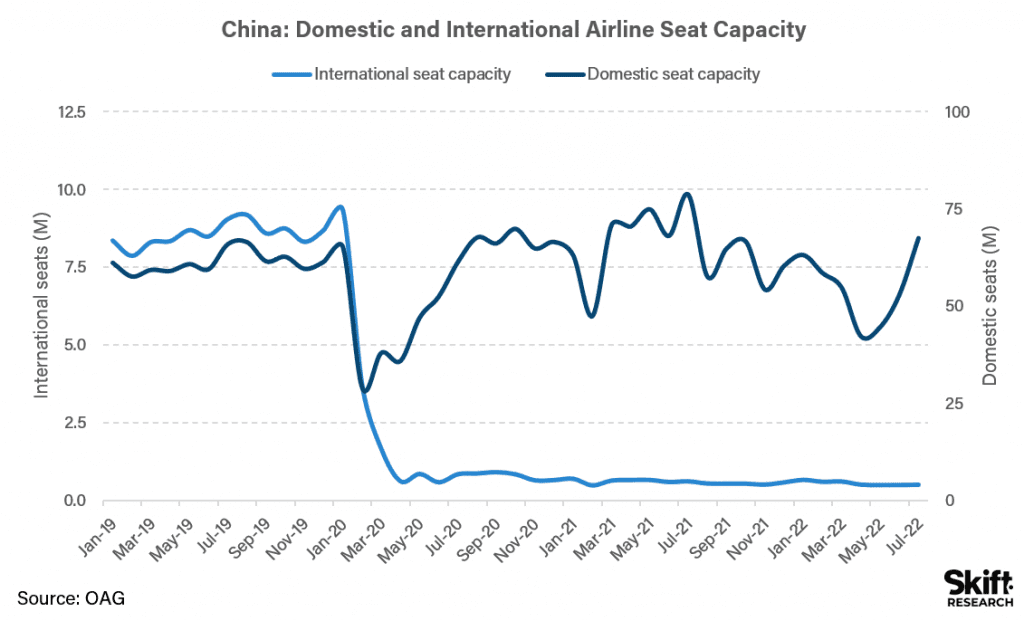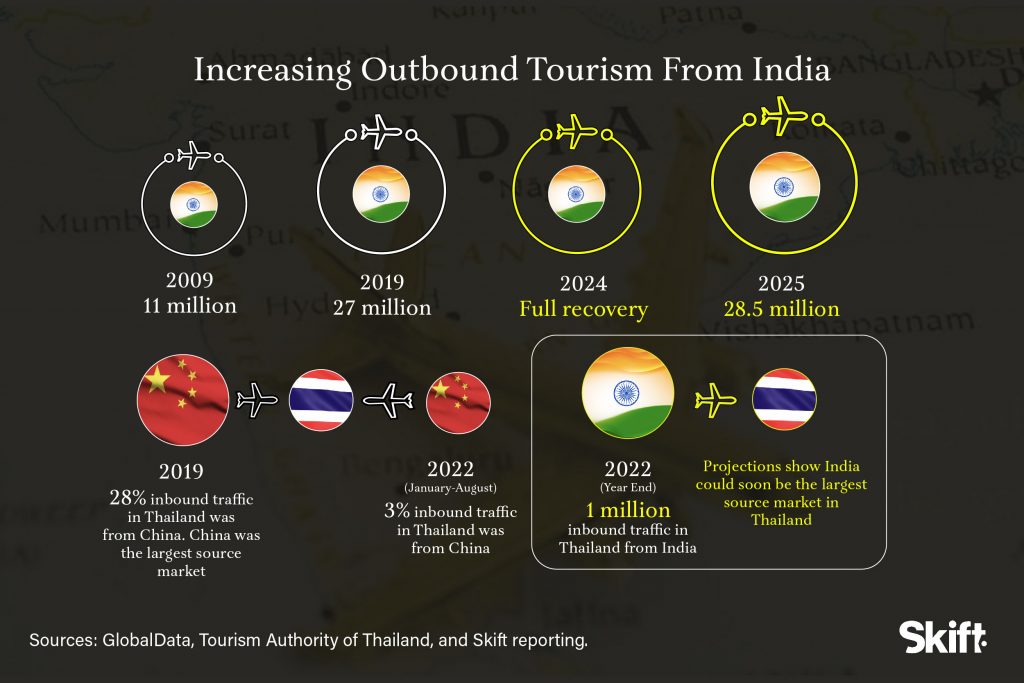India Becoming the New China in the Reordering of Asia Travel

Skift Take
China’s latest loosening of its stringent zero-Covid policy, mostly for domestic tourism, comes across as too little too late, at a time when the rest of the world is living with the virus.
Chinese tourists have said that they are still skeptical of international travel even if borders are reopened, according to a recent survey.
The time is ripe for India — which already ticks most of the boxes as a suitable candidate to take over from China as the largest travel source market — to enter the dragon’s space.
A recent United Nations population report has also said that India is projected to surpass China as the world’s most-populous nation in 2023.
In 2019, China was the largest outbound travel market in the world with Chinese tourists taking 150 million trips overseas per year while spending $255 billion, according to Skift Research’s State of Travel Report.

Highlighting the uneven recovery path of the Chinese travel industry, a McKinsey report in August stated that outbound travel is likely to remain muted for 12 to 18 months.
Destinations trying to revive their tourism-dependent economies are also looking to reduce their dependence on China and identify new source markets, India is clearly a frontrunner in this reordering of travel.
An earlier Skift article had also highlighted that while much of the post-crisis tourism recovery conversation has focused on China, India should not be neglected.
OAG, an aviation data analysis firm, said India has outperformed other Asia-Pacific countries with a faster rebound and is expected to become the new China over the next five years.
While he is sure that once China opens up tourism will bounce back — MakeMyTrip co-founder and Group CEO, Rajesh Magow, in an earlier interview with Skift had called this a short-term opportunity for India.
Between 2009 and 2019 outbound tourism from India increased 143 percent from 11 million travelers to 27 million.
Projections show a full recovery for the Indian outbound market in 2024 with outbound travelers reaching 28.5 million in 2025.
China was the largest source market for Thailand in 2019 as Chinese tourists accounted for 28 percent of arrivals into the destination. Between January and August 2022 Chinese tourists accounted for only 3 percent of the inbound traffic.
India’s large population and the availability of direct flights from many Indian cities to Thailand makes Isada Saovaros, director of the Tourism Authority of Thailand’s Mumbai office, hopeful about the country’s potential to replace China as the largest source market.
“Thailand has projected the number of Indian arrivals will rise to one million by the year end. India could soon move from being the second largest source market to rank first,” said Saovaros.
Indians emerge as Asia Pacific’s most confident travelers with 86 percent of Indians intending to travel in the next 12 months, according to Booking.com.
A report titled “Outbound Travel and Tourism - An Opportunity Untapped” by Nangia Andersen has said that outbound trips from India would surpass $42 billion by 2024.
Generation Z and millennials comprise the largest share of population in India constituting an important consumer group, with disposable incomes fueling recovery of the tourism sector.
While he believes that India certainly has the potential to fill the void left by China, Ajay Prakash, CEO of Nomad Travels, said this will not be without challenges.
Highlighting the cutback on incentive trips, Prakash also spoke about the depreciating Indian Rupee, the high airfares and the logjam in visas.
However, despite the visa backlog, Arshdeep Anand, director of Holiday Moods Adventures, noted that luxury outbound travel is at an all-time high. “Indians are big spenders and destinations have come to realize this,” Anand said.
Prakash echoed the sentiment as he said, “Indian travelers tend to be fairly high spenders, hence the efforts of countries to woo them.”
There are approximately 60 countries that Indians can travel to without obtaining a visa in advance and more and more countries — like Kazakhstan recently, and Malaysia in a limited way — are looking to facilitate easier visa regimes
“Many countries are offering subsidies and incentives to organize conventions, meetings, conferences, film shoots and weddings,” Prakash added.
The importance of the Indian market can be best exemplified in the response and sentiment Tourism Australia noticed following the reopening of borders in February.
Owing to the pent-up demand for outbound travel, India was the second biggest source market for Australia following New Zealand, said Nishant Kashikar, country manager — India and Gulf for Tourism Australia.
While visitor arrivals from India accounted for 86 percent of pre-Covid levels between April and August this year, Kashikar added that to address the travel demand, non-stop flights between the two countries have gone up from 8 flights per week in 2019 to 24 flights per week in 2022.

Prior to the pandemic, India was Australia’s fastest growing inbound market from 2017 to 2019 with double-digit growth in arrivals and spends. Notably, 400,000 Indian visitors generated $1.2 billion for the Australian economy from their visits for the year ending February 2020.
Destinations are coming to India with roadshows and training programs, noted Holiday Moods Adventures’ Anand, adding, “International airlines are also increasing connectivity from more Indian cities.”
With aircraft orders from India set to drive global jet sales and Air India preparing to make substantial investments in a “historic aircraft order,” it speaks volumes of the potential that the country has for outbound tourism.
The circumstances and statistics are both in India’s favor, and the global industry seems readier than ever to say Namaste to more and more Indian leisure and business travelers.




